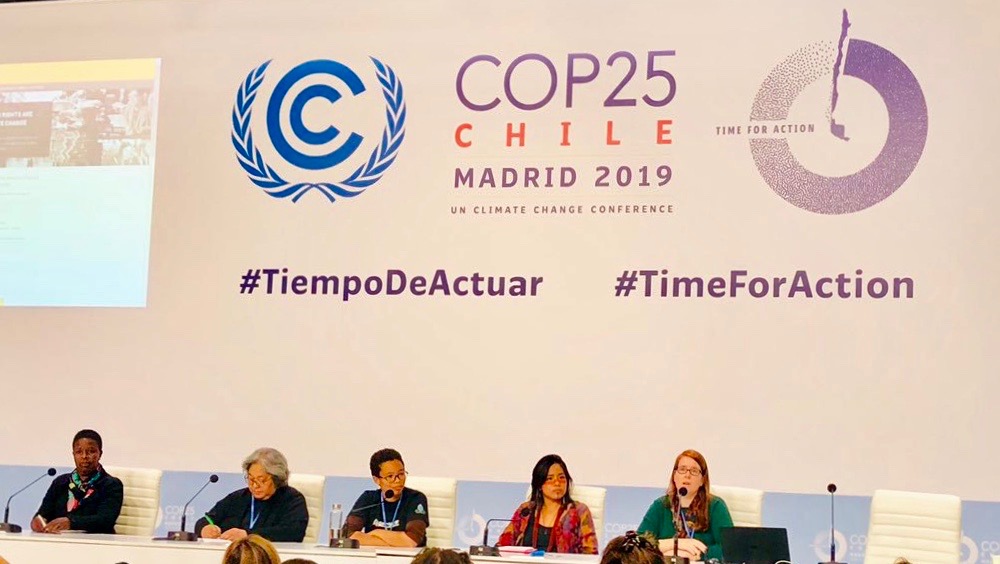
Download Here: ENGLISH
Women and Gender Rights Activists Demand Climate Justice at COP 25
For Immediate Release
04 December 2019
COP 25, Madrid, Spain
Women and gender rights defenders from over 30 countries are at COP 25 in Madrid, Spain to demand governments deliver on the 5-year Lima Work Programme on Gender by implementing a robust Gender Action Plan (GAP), committing to clear ambition on finance and addressing loss and damage and climate-induced migrations, among other pressing issues.
Since women are on the frontlines of climate change, they are also leading the development of just and sustainable solutions. Women farmers are implementing agro-ecological practises that balance social, economic and ecological needs in vulnerable regions. However, they continue to be excluded from formal processes. “Half of the farmers in sub-Saharan Africa are women, but we are ignored by policies, forgotten by extension services and left out of decision-making processes. I know from experience that agroecology – instead of chemicals sold by agribusinesses – is better for soils and produces better crops. UN climate negotiations should support agroecology and women farmers to build resilience and improve food security,” said Ellen Matupi from the Coalition of Women Farmers (COWFA), Malawi, whose organisation has trained 300,000 farmers to adopt agroecology.
The attacks on women and Indigenous Peoples in Brazil have increased with the new government. The government’s lack of commitment and action to address environmental violations and crimes shows their poor position on human rights and climate emergency. “What we see in Brazil is a setback of our rights. That is why we are here at COP25 to advocate for our voices to be heard, not only through the Local Communities and Indigenous Peoples Platform (LCIPP) but also with the guarantee of human rights in Article 6,” said Taily Terena, of National Council of Indigenous Women-CONAMI/ The Continental Network of Indigenous Women-ECMIA – Terena Nation, Brazil.
The world cannot expect the poorest peoples, especially women and the populations of impoverished countries to pay to correct a problem they did not create. “COP25 must accelerate and enhance the work on loss and damage, taking into account the needs of the most affected, including climate migrants and create a separate fund for them,” added Titi Soentoro, Aksi!, Indonesia.
At COP 25, governments must develop effective adaptation and mitigation measures to address sea level rise, ocean warming and acidification, environmental pollution on oceans and coastal ecosystems, and other harmful impacts of climate disruption. “Unfortunately, women’s contributions towards conservation and ocean-based livelihoods are almost invisible and not valued enough in many countries like mine. They are facing the same risks of ocean degradation with less resources on hand. This must change now! It’s time to share and give more visibility to good sustainable practices. It’s time to highlight and empower community-based solutions and knowledge, it’s time for action!” said Marie Christina Kolo, a young eco-feminist from the Indian Ocean Climate Network Madagascar.
Women and gender rights groups demand that governments take immediate action to stay well below 1.5 degrees if they are serious about urgently addressing climate change. “We need Parties to commit to moving money out of a war and dirty energy economy and into social and environmental solutions. By listening to the demands of the peoples most impacted, there should be a promotion of energy democracy and rights of the people, rather than corporate profit,” said Bridget Burns, WEDO, USA.
Women and gender groups will continue advocating for their rights at COP 25 in Madrid to continue holding governments accountable for this climate emergency and remind them that feminists want system change.
###
ABOUT WOMEN & GENDER CONSTITUENCY
Since the Earth Summit in 1994 the United Nations has been working with governments and civil society to tackle climate change. Every year members of each government meet at the Conference of the Parties (COP) where Civil society and non-governmental organizations are welcomed to these conferences as observers to offer opinions and expertise, and to further represent the people of the world. The Women and Gender Constituency provides a number of ways for civil society and non-governmental organizations which work for women’s rights and gender justice, environmental protection, or both, to influence the annual conferences and help develop the UNFCCC. Website: womengenderclimate.org; Twitter: @WGC_Climate
RESOURCES
- Women and Gender Constituency Key Demands: https://womengenderclimate.org/wp-content/uploads/2017/11/WGCKeyDemands-1.pdf
- Our opening interventions at COP 25: https://womengenderclimate.org/wgc-opening-intervention-at-cop25/
- Knowledge Sessions at COP 25: https://womengenderclimate.org/women-caucus-at-cop25/
FOR FURTHER INFORMATION, MEDIA REQUESTS AND INTERVIEWS CONTACT:
Neha Gupta | Email: neha@apwld.org | Phone: +34 634 713 352 (Mobile) | Phone: +66 955 282 396 (Whatsapp) | Languages: English, Hindi
Hanna Gunnarsson | hanna.gunnarsson@wecf.org | Phone: +49 152 040 585 73 | Languages: English, Swedish